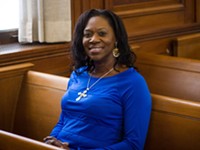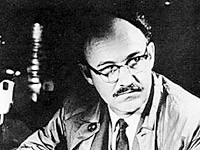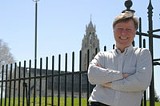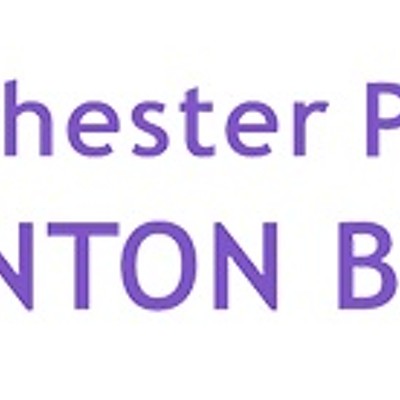[
{
"name": "500x250 Ad",
"insertPoint": "5",
"component": "15667920",
"parentWrapperClass": "",
"requiredCountToDisplay": "1"
}
]
It's strange to think the Baha Men had any relevance to the selection last week of a new pope. But with the reputation of Cardinal Joseph Ratzinger --- who's been variously labeled "The Enforcer," "Cardinal No," and "God's Rottweiler" --- "Who Let the Dogs Out" has, yet again, taken on odd meanings.
Ratzinger, now Pope Benedict XVI, has been commonly stereotyped as an unthinking reactionary. As prefect for the Congregation for the Doctrine of Faith, a post he's held since 1981, he's literally been the enforcer of the Catholic orthodoxy. But his deeply intellectual approach to that role belies the public perception that he's simply operating on reflex. At his core, Ratzinger rejects the reasoning of legendary philosopher Immanuel Kant and other Enlightenment thinkers by arguing that "truth" is not subjective and that there's only one way, and one God, to that truth.
This conclusion has left a wide range of targets in Ratzinger's sites --- liberation theology, religious pluralism, or even basic religious interpretation. He's suggested that supporters of abortion rights be denied communion. And through the Congregation for the Doctrine of Faith, Ratzinger has censured, warned, or suspended some of the church's most progressive thinkers. So it's no wonder Ratzinger's got a hefty and particularly alarming rep, especially among reform-minded western liberals.
Even closer to home, Ratzinger's had a direct effect on the life and calling of a priest in the Diocese of Rochester. Pastor Jim Callan was suspended from priestly duties and fired from his position at Corpus Christi Church, 880 East Main Street, in 1998, after Cardinal Ratzinger sent a letter to Bishop Matthew Clark asking to have Callan removed and replaced with a "trustworthy" priest.
Ratzinger found Callan guilty of committing three "errors": distributing the Eucharist to non-Catholics, blessing same-sex unions, and allowing a woman to serve at the altar. Callan's still a Catholic priest --- he's not been defrocked or laicized --- and he's working out of five area churches to serve a 1,500-member delegation called Spiritus Christi. "The Roman Catholic Church says our sacraments are valid but illicit," he says.
We sat recently with Callan to get his perspective on the Ratzinger appointment and his thoughts on the state of the church, and of churchly dissent, moving forward. There are advantages to his suspension, Callan says. And the Ratzinger appointment, he says, could galvanize progressive Catholics to reclaim their church. Following is an edited transcript of that interview.
City: What's your status as a Catholic?
Callan: Still Catholic. There's a lot of Catholic churches. One of them is the Roman Catholic Church, which is the biggest. But there are other Catholic churches. So we just call ourselves Catholic. We actually like that term. "Catholic" means universal, all-embracing. When you say Roman Catholic, it's an oxymoron.
City:Are you disappointed by the Ratzinger selection?
Callan: It's heartbreaking that the church would elect a leader who has a known record for discrimination against women and gay people. It's one thing for the cardinal to hold those views. It's another thing for 70-plus cardinals to vote for a man who's already on record as saying that women are excluded from priesthood and gay people cannot express themselves sexually or get married.
Maybe you could forgive them if this was an unknown candidate from some country in Africa and we don't know where he stands and all of a sudden he comes out with these conservative views. But we already know exactly where Cardinal Ratzinger stands, and they chose him. To me, it's very sad and disrespectful of the church. It seems the people in power just want to keep the old boys' club in power.
City: Did you see this coming?
Callan: No. I'm surprised. I could not believe it when I heard Cardinal Ratzinger was the one. I just could not believe it. I thought for sure people would see the need for a new church. The particular cardinals who voted apparently don't share the viewpoints of the church.
City: In some of the reports on the death of Pope John Paul, there have been references to one of his predecessors, the reformist Pope John XXIII. Could you refresh our memory of Pope John XXIII and contrast him briefly with Pope John Paul?
Callan: Pope John XXIII was 77 when he was made pope in 1958. [John XXIII died in 1963.] He was supposed to be a transitional pope like Pope Benedict, just in for a couple of years, holding things together until they figured out where they were going. And all of a sudden he called the Vatican Council, which turned the church inside out and did great reforms with recognizing the laity.
They started calling the church "the people of God," which is great, instead of an institutional, hierarchical organization. There were advances in the laity, advances in ecumenical relationships. It was great. There was "subsidiarity," with decisions affecting the people being made on the most appropriate, lowest level. And there was collegiality, sharing power with fellow bishops. There was great movement toward reaching out to people of other religions, allowing priests to get married, having women priests.
Pope John Paul II turned many of those reforms back. He was very autocratic, making all those decisions on his own without consulting people.
City: Some of Cardinal Ratzinger's supporters describe him as a humble, shy, gentle, and serene person. Others refer to him as "the Grand Inquisitor." What's your perception?
Callan: I think he's both of those things. I think he is shy and loving. I think he's a good man. He's also the person who's been in charge of the Congregation for the Doctrine of Faith since 1981, which is the new name for the Inquisition, so he's been the enforcer of orthodoxy.
City: Could it be the nature of that position that made him a lightning rod for criticism from progressives in the Catholic faith? Some Catholics seem to believe that he might act differently --- that perhaps the position as pope might change him.
Callan: It's always possible, but I really doubt it. I think he was chosen because of his views, and they expect him to keep enforcing things. Some of the American cardinals have said they want to get a clear definition of the church: "This is what we stand for, like it or leave it." And I think that was the thinking behind getting Cardinal Ratzinger in there. And I don't think we're all of a sudden going to see a human face on this vocation.
City: What, specifically, are your concerns about Cardinal Ratzinger as pope?
Callan: The three issues I got removed for and that we got in trouble for were doing gay weddings, having women on the altar, and giving communion to people who aren't Catholic. Those are three huge issues that affect the church. And the presumption is that Cardinal Ratzinger, now Pope Benedict XVI, is going to be the same man facing those issues.
Those are issues I expect him to have consistency on, which is bad for the church. It's bad because of the first two issues: women and gay rights. That's discrimination. Another word for discrimination is sin. It's always wrong for one group to put down another, for one group to dominate or exclude another.
If Cardinal Ratzinger said, "I think black people ought to be subjugated and deprived of their rights," would people vote for him? I don't think so. We need to see it in the same light. Discrimination against women is not just an opinion that can be debated and talked about. It's a moral issue. It's wrong. You can't exclude women just because of their gender.
City: What do we know about his pronouncements on poverty and the responsibility of wealthy people and wealthy nations to help the poor, issues on which John Paul was eloquent?
Callan: That remains to be seen. I don't know. It would be nice if he had a lot to say on that, or especially against the war in Iraq, like his predecessor. That was nice.
City:Isn't it assumed that he would be opposed to the war in Iraq, that it's not a Just War?
Callan: I don't think so. I think that was John Paul's momentum. It would be nice if Pope Benedict followed that. But it's not a given. It should be a given for people who follow Jesus, but it hasn't been.
City: In his homily before the cardinals gathered to select a new pope, Cardinal Ratzinger spoke of the "dictatorship of relativism." Explain the meaning of that phrase. And do you believe that signals how he will act as pope?
Callan: I think he will be an absolutist leader, all black and white. He probably considers the gay issue a relative issue, so believing that gay people should have the same rights as straight people, that's something he would consider "relativizing" a moral issue. And to me, that's more an unawareness of people who are gay.
I speak from my own experience, because I came from a pretty ignorant position to an enlightened position only because I got to know gay people. And that was very important for me, to hear their stories and listen to them over and over again. I just listened to them. And that's what changed me to start doing their unions and weddings and just understanding something I didn't understand before.
So when Cardinal Ratzinger has these rigid viewpoints on gay sexuality, I think he hasn't listened enough. He hasn't been exposed enough to people who are gay.
City:Are there positive things about his selection? What good do you see his papacy bringing?
Callan: People will see that the church will not move forward in its renewal and that it's up to them to start standing up and reclaiming the church. I think that's quite a possibility.
City: How does that happen on a practical level?
Callan: By more Spiritus Christis. Women, for example, who want to be priests will say, "Look, we were waiting for the pope to die, and now we've got more of the same." They're going to go with other Catholic bishops who do ordain women. I think we're going to see that. Because people are finite. And if you're a 45-year-old woman and you've got X number of years to answer your call to the priesthood, and you think a pope or two are going to bar you from it, then you might do that.
And I think there will be congregations who just decide: "We can't do this. This is not right. It's wrong, and we're going to do things differently." I think that might be a real possibility.
We get invited all over the country to speak to groups. There are little Spiritus Christis all over the place. We get a lot of publicity, because we're big [1,500 people]. But there are little groups of 12, 15, 150. And a lot of them are congregations led by priests who've gotten married and decided, "Wait a minute. I'm still a priest."
City: Are they all suspended priests?
Callan: Yeah, they're all like me.
City: So they all assume the penalties that come with making such moves. But it's not preventing them from doing what they're doing.
Callan: Correct. And in most cases, there aren't any penalties because they're too small. The reason they moved on us is because we're big.
City: Describe what some of those penalties are, how they affect you practically. Obviously you're still practicing; you still have a congregation. How have things changed since your suspension?
Callan: I'll give you the improvements first: We're much more free. We now have solved the vocation shortage crisis. We have three priests because we don't discriminate with gender. So my job has gotten much easier. Now there are three priests to do weddings, funerals, answer emergencies.... So it's better for my health, personally.
And we now have a mixture. It's better for the congregation to see married people and single people, women and men, as their leaders, as priests. There's a huge advantage to that.
It's a huge advantage to gay people, because now they can get married in church. They don't have to do it in restaurants or their backyards. They don't have to hide. They can do it right up front. That's a huge advantage.
The disadvantages to me would be that I'm not allowed to function in the Roman Catholic churches. For example, this past Sunday I was invited to concelebrate the mass for a sister who's celebrating 70 years as a sister of St. Joseph in Johnson City. So she was all excited; she invited me to come.
She said her pastor knew I was suspended, but he'd let me do it anyway. But the other concelebrant was Bishop Costello from Syracuse, and when he heard about it, he called the pastor and said Callan can't. So just when you think there's an opening, it closes. That's a disadvantage.
And I don't get invited too many times to speak at Roman Catholic gatherings. On the other hand, that's been offset by open doors elsewhere. Actually, we lost one church and gained five. We have five churches right now. On Tuesday we have mass at Emmanuel Baptist Church. Every Sunday we have a mass in Riverside United Methodist Church in Elmira. We have the Downtown United Presbyterian Church, and we have Hochstein. That used to be a church. Finally, we have the Ascension Episcopalian Church in Buffalo that we use once a month. So anyway, we have open doors from the other Christian communities we didn't have before.
The Roman Catholic Church says our sacraments are valid but illicit. It's strange, I know. But I'll explain it: Let's say I'm a surgeon and I do my surgery at St. Mary's Hospital, and St. Mary's doesn't like me so they revoke my license. But I can still do surgery and the job works. It's illegal, but it works. In other words, if I baptize a baby, the baptism holds. If I marry someone, they're married.
So there really aren't too many disadvantages. Even if they went ahead and laicized me, that wouldn't make any difference, either. Actually, to me it would be contradictory because they always said priests are priests forever, no matter what.
City: How do progressive Catholics reconcile the need to hold on to some teachings and discard or broadly interpret others? Are progressive Catholics becoming an endangered species?
Callan: I think they're becoming disillusioned. A few stay with it, but probably most do not. So the church is becoming more and more conservative, because the others are squeezed out or bail out. The same thing happened in the priesthood. All the colorful ones, all the ones who had a sense of excitement got out of it. You're left with all the ones who want to stay safe and loyal, and you're missing the cutting edge, the risk takers.
You've got to allow some tension in the church. If you really believe the Holy Spirit is in charge of the church, then you can live with some diverging views. The Vatican Council said a nice thing: "Let there be unity in the things that are necessary, and freedom in the things that are unsettled, and let there be charity in every case."
City: Our perception is that the church has not encouraged dissent and discussion --- in fact, that it has stifled and punished dissent.
Much of the world, including many people of other faiths, disagrees strongly with the Catholic Church on the issue of birth control and the role of women. And many people of strongly held faith disagree with the Catholic Church on the issue of homosexuality.
Could you describe the importance of the church encouraging dissent? Can the church inspire liberal Catholics or even atheists, and not just conservatives?
Callan: I believe the seeds of a broader church are still there. There's no expression for dissenters right now, but it's in our history. Certain historians say when Protestants disagree, they start their own sect; and when Catholics disagree, they start their own orders, like the Basilians, the Jesuits.... Those were done by people who were disgusted with where the church was going. So there's been a history of dissent.
City: Does the appointment of someone like Ratzinger cause a chilling effect among potential dissenters?
Callan: People operate out of fear: "Am I gonna lose my job?" But we follow Jesus --- and he lost everything. You've got to be able to take some chances if you believe in the truth. Right now everyone's very timid and very fearful. It's orthodoxy versus the healing mission of the church. Jesus had a lot of different choices: to stick to the rules or to be faithful to his healing mission. If a gentile woman needed help, he wasn't supposed to deal with her. If he stuck to the rules, he wouldn't be able to help her. But he felt his mission to heal was superior to the rules. To be true to our mission as a church, we have to break the rules.
City: The new pope seems to be rigidly tied to the notion of "truth" as he interprets it from Scripture.
Callan: People have written about the need to hold on to power. It's a power issue. The sexual abuse issue was a power thing. Instead of protecting the people, they protected their own base.
It's telling when you look at the pictures of the pope's death. He was surrounded by men. All men. Imagine how that limits perspective.
I grew up in Irondequoit and went to school with white people. But I came to a church where I met Latinos for the first time, black people for the first time, Protestants, gay people. People would come up and say: "You can't speak that way. It's demeaning to gay people." And I listened. I can't thank those people enough for that. I'm very happy they had the courage to come up and talk to me.
But how can white men who are in power give you a perspective on the world? I think it's a huge problem.
City: A recent editorial in The Nation ends with an intriguing question: whether "Catholics who identify with the opening to the world of Pope John XXIII will now reclaim their church." Is that likely to happen?
Callan: It's more likely to happen now than it was last week. Because I think a lot of people believed things would change at the death of John Paul II. People told us: "Don't rock the boat. This pope will die." People said it like that. And now they have someone who is even more conservative.
But I think this is the opening. And I think change will have to happen at a grassroots level. I think this is the John XXIII moment.
Speaking of...
-

The stained-glass ceiling
Feb 8, 2017 -

Pope makes moral appeals to Congress
Sep 24, 2015 -

Catholic bishops' changing views on gays
Oct 14, 2014 - More »
Latest in News
More by Chad Oliveiri
-

Fiz - 1.11.06
Jan 11, 2006 -

Final cut pro
Nov 16, 2005 -
It’s the economy, stupid
Jul 27, 2005 - More »






